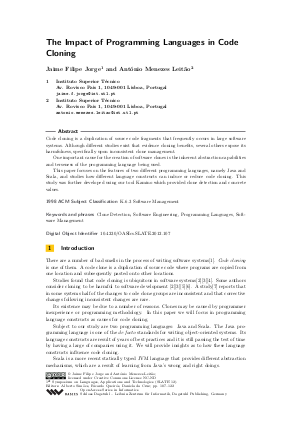The Impact of Programming Languages in Code Cloning
Authors Jaime Filipe Jorge, António Menezes Leitão
-
Part of:
Volume:
1st Symposium on Languages, Applications and Technologies (SLATE 2012)
Part of: Series: Open Access Series in Informatics (OASIcs)
Part of: Conference: Symposium on Languages, Applications and Technologies (SLATE) - License:
 Creative Commons Attribution-NonCommercial-NoDerivs 3.0 Unported license
Creative Commons Attribution-NonCommercial-NoDerivs 3.0 Unported license
- Publication Date: 2012-06-21
File

PDF
OASIcs.SLATE.2012.107.pdf
- Filesize: 455 kB
- 16 pages
Document Identifiers
Subject Classification
Keywords
- Clone Detection
- Software Engineering
- Programming Languages
- Software Management
Metrics
- Access Statistics
-
Total Accesses (updated on a weekly basis)
0PDF Downloads0Metadata Views
Abstract
Code cloning is a duplication of source code fragments that frequently occurs in large software systems. Although different studies exist that evidence cloning benefits, several others expose its harmfulness, specifically upon inconsistent clone management. One important cause for the creation of software clones is the inherent abstraction capabilities and terseness of the programming language being used. This paper focuses on the features of two different programming languages, namely Java and Scala, and studies how different language constructs can induce or reduce code cloning. This study was further developed using our tool Kamino which provided clone detection and concrete values.
Cite As Get BibTex
Jaime Filipe Jorge and António Menezes Leitão. The Impact of Programming Languages in Code Cloning. In 1st Symposium on Languages, Applications and Technologies. Open Access Series in Informatics (OASIcs), Volume 21, pp. 107-122, Schloss Dagstuhl – Leibniz-Zentrum für Informatik (2012)
https://doi.org/10.4230/OASIcs.SLATE.2012.107
BibTex
@InProceedings{jorge_et_al:OASIcs.SLATE.2012.107,
author = {Jorge, Jaime Filipe and Leit\~{a}o, Ant\'{o}nio Menezes},
title = {{The Impact of Programming Languages in Code Cloning}},
booktitle = {1st Symposium on Languages, Applications and Technologies},
pages = {107--122},
series = {Open Access Series in Informatics (OASIcs)},
ISBN = {978-3-939897-40-8},
ISSN = {2190-6807},
year = {2012},
volume = {21},
editor = {Sim\~{o}es, Alberto and Queir\'{o}s, Ricardo and da Cruz, Daniela},
publisher = {Schloss Dagstuhl -- Leibniz-Zentrum f{\"u}r Informatik},
address = {Dagstuhl, Germany},
URL = {https://drops.dagstuhl.de/entities/document/10.4230/OASIcs.SLATE.2012.107},
URN = {urn:nbn:de:0030-drops-35178},
doi = {10.4230/OASIcs.SLATE.2012.107},
annote = {Keywords: Clone Detection, Software Engineering, Programming Languages, Software Management}
}
